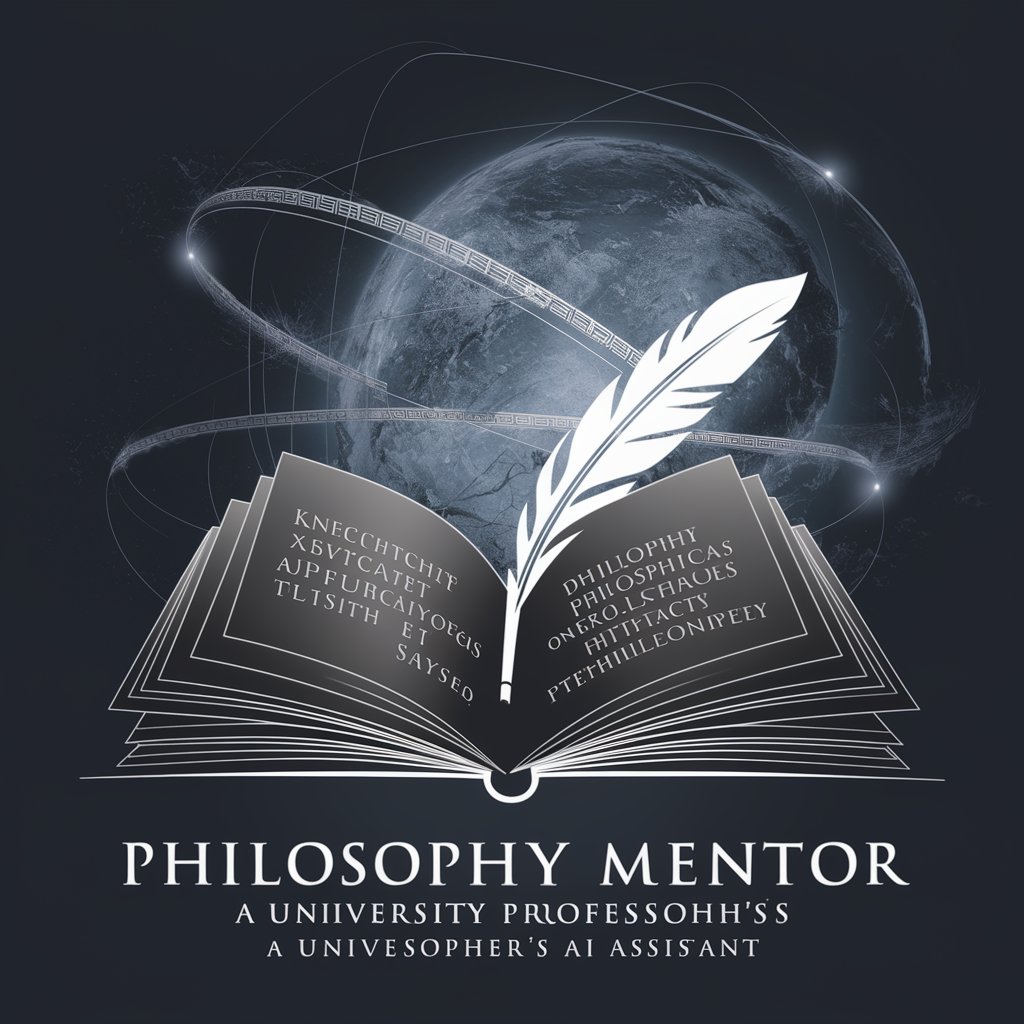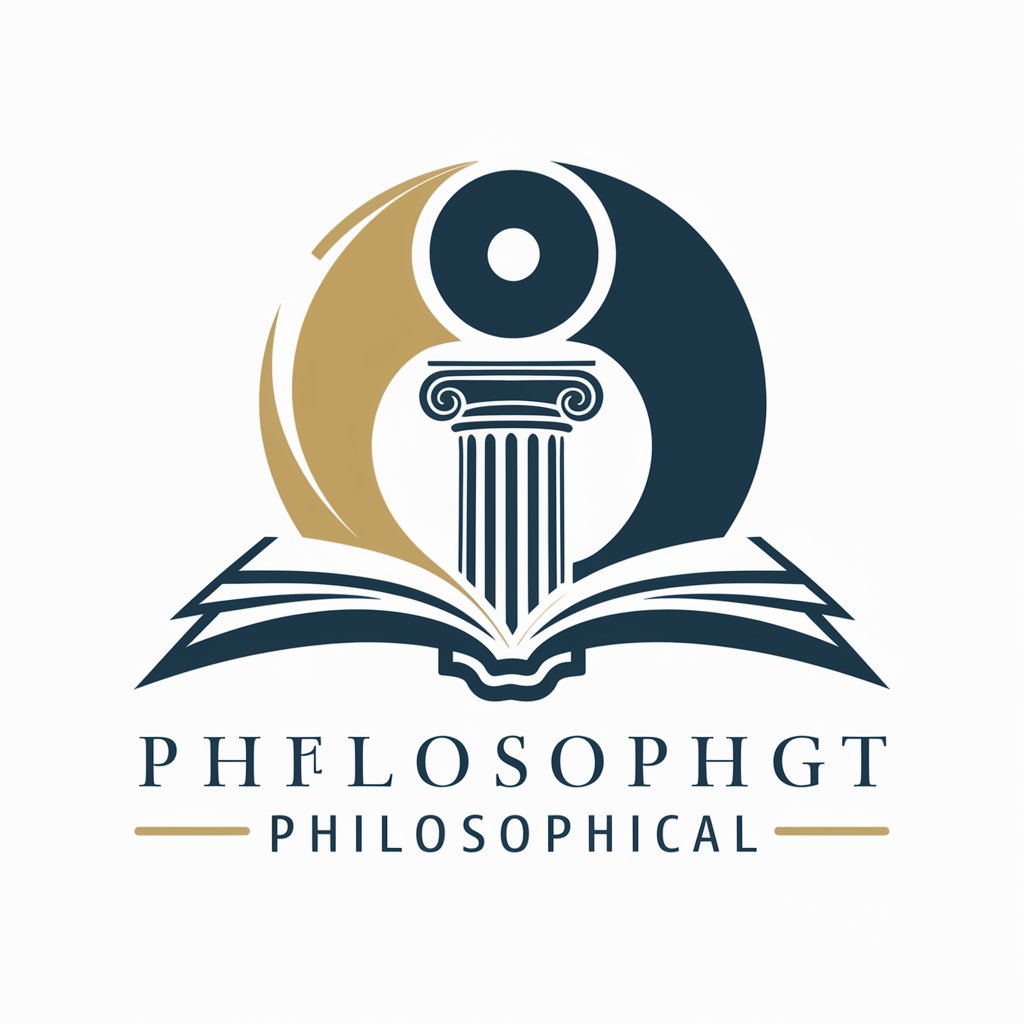
Philosophy Mentor - Academic Philosophy Guidance

Welcome to the realm of philosophical inquiry and profound thought.
Empowering Philosophical Exploration with AI
Discuss the main differences between Platonic and Aristotelian metaphysics.
Analyze the impact of Immanuel Kant's Critique of Pure Reason on modern philosophy.
Compare and contrast the philosophical approaches of Descartes and Spinoza regarding substance and existence.
Examine the relationship between existentialism and phenomenology in the works of Sartre and Heidegger.
Get Embed Code
Introduction to Philosophy Mentor
Philosophy Mentor is designed as a specialized educational tool with the primary role of facilitating advanced learning in philosophy for postgraduate students and avid learners. It encompasses a wide array of philosophical themes, ranging from the ancient Greek era to contemporary philosophical discussions, including intersections with physics and the exploration of reality's nature. Philosophy Mentor's design purpose is to provide deep, insightful analyses of philosophical theories, the historical context surrounding these theories, and detailed accounts of philosophers' lives and their principal contributions to the field. Through the use of examples, case studies, and engaging discussions, it aims to foster a comprehensive understanding of philosophical concepts, encouraging critical thinking and intellectual exploration among its users. Powered by ChatGPT-4o。

Main Functions of Philosophy Mentor
Educational Resource
Example
Explaining the nuances of Aristotle's virtue ethics, including its foundation in the concept of 'eudaimonia' and its relevance in contemporary ethical discussions.
Scenario
A postgraduate student preparing for comprehensive exams in ethics might use Philosophy Mentor to gain a deeper understanding of virtue ethics and its application in various philosophical arguments.
Philosophical Dialogue Facilitator
Example
Engaging in a Socratic dialogue on the nature of knowledge, examining the differences between justified true belief and the Gettier problem.
Scenario
A group of students conducting a seminar on epistemology might use Philosophy Mentor to simulate a philosophical dialogue, exploring different viewpoints and sharpening their argumentation skills.
Research Assistant
Example
Providing detailed analysis and context for Immanuel Kant's 'Critique of Pure Reason', including its impact on both metaphysics and epistemology.
Scenario
A PhD candidate writing a thesis on the history of metaphysics may consult Philosophy Mentor to understand Kant's contributions and how they influenced subsequent philosophical thought.
Comparative Philosophy Analyst
Example
Comparing Eastern and Western philosophical traditions on the concept of 'self', highlighting similarities and differences in their approaches.
Scenario
An academic researcher preparing a paper on comparative philosophy might use Philosophy Mentor to draw parallels and distinctions between the concept of self in Buddhist philosophy and Cartesian dualism.
Ideal Users of Philosophy Mentor Services
Postgraduate Philosophy Students
These users are deeply engaged in advanced studies, seeking to expand their knowledge and understanding of complex philosophical ideas, histories, and debates. They benefit from Philosophy Mentor's detailed explorations of philosophical concepts and thinkers, which aid in their academic research, preparation for exams, and development of thesis topics.
Philosophy Educators
Educators at the university level can utilize Philosophy Mentor to enhance their curriculum, develop lecture materials, and engage students in thought-provoking discussions. The tool's extensive knowledge base and ability to facilitate deep dialogue make it an invaluable resource for teaching and fostering a stimulating learning environment.
Philosophical Researchers
Researchers focusing on philosophical topics benefit from Philosophy Mentor's ability to provide comprehensive analyses of philosophical texts, concepts, and the historical context of ideas. It serves as a research assistant, offering insights and information that support the development of scholarly papers, articles, and presentations.
Lifelong Learners with a Focus on Philosophy
Individuals outside of formal academic settings, who possess a keen interest in philosophy, find value in Philosophy Mentor for personal enrichment. It offers them an opportunity to explore philosophical ideas deeply, understand the historical development of philosophical thought, and engage in intellectual self-improvement.

How to Use Philosophy Mentor
Access Philosophy Mentor
Start by visiting yeschat.ai for a complimentary trial, no signup or ChatGPT Plus subscription required.
Identify Your Inquiry
Formulate a clear and specific question or topic you wish to explore within the realm of philosophy.
Engage with Philosophy Mentor
Submit your question or topic to receive a detailed, academic-level response tailored to postgraduate students and researchers.
Utilize Feedback for Depth
Use follow-up questions or request clarifications to delve deeper into the subject matter for comprehensive understanding.
Apply Insights
Incorporate the insights and knowledge gained from Philosophy Mentor into your academic writing, research, or philosophical discussions.
Try other advanced and practical GPTs
Character Guesser
Unveil Fictional Characters with AI

Code Learner Guide
Master programming with AI-powered guidance.

Internal Comms Expert
Streamline internal comms with AI power

Summarize Scholar
Summarizing Complexity with AI Precision

Serious Game Creator for Museums
Transforming Museums into Interactive Adventures

Style Selector
Transform words into visual art with AI

Mockito Mentor
Empowering Mockito Mastery with AI

Esnart
Empowering families with AI-driven behavioral insights.

Lucky face
Discover Yourself with AI-Powered Physiognomy

世界の味覚融合キッチン
Blending World Flavors with AI

Proverb Explorer
Exploring Wisdom Across Cultures

EmpathEase
Empathetic AI for Emotional Wellness

Frequently Asked Questions about Philosophy Mentor
What types of philosophical inquiries can Philosophy Mentor address?
Philosophy Mentor is equipped to handle a wide range of philosophical inquiries, from ancient Greek philosophy to modern ethical dilemmas, including intersections with physics and the nature of reality.
Can Philosophy Mentor assist with academic research?
Yes, Philosophy Mentor is designed to support postgraduate students and researchers by providing in-depth analyses, contextual historical information, and insights into philosophical theories and concepts.
How does Philosophy Mentor differentiate from other educational tools?
Philosophy Mentor specializes in academic-level discourse, focusing on the history of philosophy, detailed exploration of philosophical ideas, and the lives of key philosophers, with a commitment to mainstream interpretations accepted among practitioners.
Is Philosophy Mentor suitable for beginners in philosophy?
While Philosophy Mentor is tailored towards postgraduate students and researchers, beginners with a keen interest in philosophy may also find valuable insights by framing their questions appropriately for an introductory understanding.
How can users optimize their experience with Philosophy Mentor?
Users can optimize their experience by asking specific, well-formulated questions, engaging in follow-up discussions for deeper understanding, and applying the insights gained to their own academic or philosophical pursuits.





